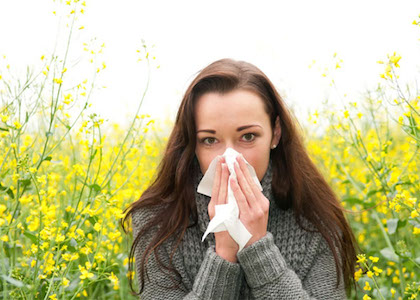
Allergies? 12 Ways to Reduce Seasonal Health Issues
By Claire Georgiou, Reboot Naturopath, B.HSc ND
Seasonal and temperature changes can predispose us to many health ailments such as colds and flu’s, seasonal allergies, asthma, heat exhaustion, migraines, skin disorders, mood disorders, changes in blood pressure, infections, pain and arthritis.
These changes can affect a person’s physical and mental health and well-being and may worsen the symptoms of existing disorders. Let’s first discuss how different temperatures can affect our bodies:
- Researchers agree that extreme temperatures, both hot and cold, stress the human cardiovascular system, as well as other parts of the body. Studies have shown that more deaths occur in the cooler months than any other time of year.
- Seasonal changes can cause a rise in allergy related disorders due to pollens (in spring) and ragweed (in fall/autumn), moulds (in high humidity and warmer conditions) and animal dander (increased hair loss in warmer weather).
- Spring brings lots of pollen from trees, grasses, and weeds which can trigger rhinitis and/or or seasonal allergies. Allergens can also cause an increase in asthma flare-ups and other respiratory conditions and in cooler temperatures asthma can be reactive due to temperature drops, when the cool air doesn’t have a chance to warm up it can cause the airways to swell and react.
- Lack of sunshine in the cooler months has also been associated with SAD (seasonal affective disorder) where people often feel more prone to sadness, irritability, fatigue, anxiety and depression due to reduced sunlight exposure and less Vitamin D production. Even when people don’t suffer with SAD they can still be affected to some degree by a drop in mood when they are exposed to less sunlight. People can also feel this when it rains for long periods and you have to stay indoors for a length of time.
- Higher humidity with cooler temperatures has also been associated with arthritic pain, although this is not supported largely with consistent studies but it is experienced by many. I think everyone may have an elderly family member that will tell us that it may rain due to their joint pain.
- Cooler months and temperature changes can also suppress our immunity causing an increased risk of colds and flu’s and other infections. A drop in temperature can suppress our white blood cell activity combined with viral infections spreading more readily preferring dry cold air thus increasing our infection risk.
- In contrast high temperatures can cause many people to suffer with heat related conditions such as heat exhaustion. Heat exhaustion is a relatively common reaction to severe heat and can include symptoms such as dizziness, headache and fainting. Extreme heat is blamed for an average of 688 deaths each year in the U.S., according to the Centers for Disease Control and Prevention (CDC).
Ways to reduce seasonal health related conditions:
- Increased fruit and vegetable consumption – Allergies may be improved with an increase in nutrients and antioxidants in the diet supporting a healthy immune system – A Reboot can help!
- Eating specific foods that have been shown to support a healthy immune system – Up your intake of garlic, ginger, pineapple, cherries, citrus, horseradish, turmeric, oregano and thyme.
- Exercise – Staying active improves joint pain and swelling as immobility has been shown to increase pain and stiffness in arthritic conditions – swimming can be helpful due to the reduced gravity and weight bearing on the joints while encouraging movement and blood flow to the area. Cycling can also be beneficial. Exercise will also vastly improve SAD and poor mood during reduced sunlight exposure.
- Herbal medicines – There are many herbal medicines that can reduce allergic reactions by reducing the over-reaction of the immune system and supporting an anti-inflammatory effect. Herbal medicines can also support mood, reduce pain and swelling of arthritis, offer anti-microbial effects against infections and support general well-being.
- Dietary supplements where needed – Vitamin D (if you are deficient), horseradish, zinc, vitamin C and Garlic for upper respiratory inflammation, probiotics for allergies & immunity.
- Consuming fermented foods – fermented foods support a healthy immune system which may protect you against allergies and colds and flu’s. Here is more on the benefits of fermented foods!
- Drinking warming teas and broths –Lemon and ginger tea can reduce allergy symptoms, colds and flu’s and can also reduce upper respiratory inflammation due to the carminative and anti-inflammatory effect. Studies have shown that ginger has potent antioxidant, anti-inflammatory and antimicrobial properties.
- Avoid processed refined foods – Processed foods suppress the immune system and have a pro-inflammatory effect.
- Avoid possible food allergens – Often people with allergies whether they are food related or not can be largely affected by their diet. Following an elimination diet can assist in identifying foods that may be further aggravating allergies and other inflammatory conditions.
- Avoid environmental allergens where possible – Use an air purifier to reduce pollens, ragweed and mould exposure in your living areas. Keep living areas well ventilated.
- Burning essential oils –Tea tree, eucalyptus and peppermint which can reduce colds/flu’s and respiratory conditions. You can also use these oils in inhalations and hot baths.
- Keeping warm and well wrapped up in the cooler months and on the very warm days it is important to rest, hydrate particularly with electrolytes and keep cool.